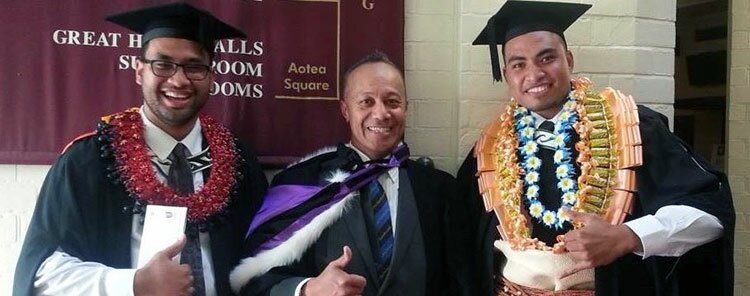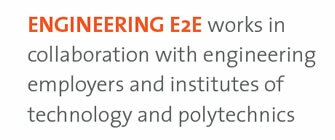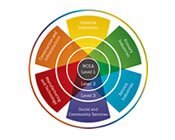INDUSTRY/EDUCATION LINKS CASE STUDY
Mentoring Pasifika engineering students

How can educators and employers encourage young Pasifika people into engineering pathways and support them to achieve? We talked to Winston Hiliau, Pacific Mentor for Unitec’s Civil Engineering Department, about his role.
Why provide support for Pasifika engineering students?
It's well recognised that New Zealand needs to encourage more young people into engineering, but is that enough? Should we also be tackling the problem around wasted potential? The country would benefit from a professional workforce as diverse as our population but there are proportionately far fewer Pasifika students at all levels of engineering programmes. Pasifika will make up a larger proportion of young New Zealanders in the future, young people with potential who could meet our shortage of domestic engineering graduates. We need to encourage more Pasifika into engineering careers.
 We know that there is a lack of awareness about engineering pathways amongst students, parents, teachers and the wider public, and Pasifika students face additional barriers. Their parents are less likely to have had experience in the tertiary education system, and often encourage their children to study medicine or law as providing the most opportunity. Sport – ruby union and rugby league – may be perceived as an easier pathway and a faster way for families to earn money, but thousands don’t make it.
We know that there is a lack of awareness about engineering pathways amongst students, parents, teachers and the wider public, and Pasifika students face additional barriers. Their parents are less likely to have had experience in the tertiary education system, and often encourage their children to study medicine or law as providing the most opportunity. Sport – ruby union and rugby league – may be perceived as an easier pathway and a faster way for families to earn money, but thousands don’t make it.
To attract more Pasifika students, we need to promote the opportunities and rewards in an engineering career, highlight the various pathways, and support them in enrolling in and achieving their qualification.
Existing tertiary support
Most tertiary institutions have mentors to support Pasifika students, some under the ‘Maori and Pasifika’ umbrella. Few, however, provide engineering-specific mentoring. Those which do include the University of Auckland: it’s SPIES (South Pacific Indigenous Engineering Students) and Tuakana Engineering Programmes both provide mentoring for Maori and Pasifika students.
Read about Tuakana at the University of Auckland
In response to the Government’s Strategy for Education 2010-2015, which stated ‘To improve New Zealand’s economy and future growth we need to lift workforce skills, especially for young Maori and Pasifika’, Unitec decided to provide mentoring for Pasifika and Maori engineering students. In 2010, the department appointed Winston to a part-time mentoring role.
Establishing the Pacific Mentor role
 Moana – The Pacific Way was launched at a departmental staff meeting in 2011. Experts from the tertiary education and industry sectors gave presentations about successful strategies to encourage first-year cohorts’ enrolment in engineering and promote staff diversity within companies.
Moana – The Pacific Way was launched at a departmental staff meeting in 2011. Experts from the tertiary education and industry sectors gave presentations about successful strategies to encourage first-year cohorts’ enrolment in engineering and promote staff diversity within companies.
 After discussing the mentoring role and considering the different customs, values and obligations that Pasifika students have in comparison to other ethnic groups, the department decided to create a Pacific Mentor specifically for Pasifika students.
After discussing the mentoring role and considering the different customs, values and obligations that Pasifika students have in comparison to other ethnic groups, the department decided to create a Pacific Mentor specifically for Pasifika students.
Winston, who also lectures in the Civil Engineering department and supervises undergraduate research, took on the new, full-time Pacific mentor role. With 21 years’ industry experience as a civil construction engineer behind him, Winston is able to give students an insight into engineering careers.
The mentor’s role
The Pacific Mentor provides academic support for all Pasifika students enrolled in engineering (usually first- to third-year students rather than those completing foundation studies). He keeps an eye on students’ progress, talks to anyone having difficulty, and encourages them to complete the required coursework on time. Winston also supports any students with personal issues which cause them concern. “My role is 24/7, if they text me at 11:00 pm, I respond.”
Responding to Pasifika issues
Appointing a Pasifika engineer was an important aspect of the initiative. Born in Tonga and educated in Auckland, Winston brings his knowledge of Pasifika cultures to the job and acts as a role model for students. His enthusiasm for rugby, including experience in coaching premier club and Auckland under-21 representative teams, provides an extra connection with students.
 Winston notes that Pasifika students, in contrast to those from other cultures, tend to come from backgrounds where family is the focus and individual identity less so. “They’re quite a complex group, in terms of experiencing life as a tertiary student and also as a young Pacific person. I help in that move away from the home environment and instil some of the life skills they’ll need, helping them establish their own identity away from home. I help every student in trying to create a demarcation between home and what is required at tertiary level.”
Winston notes that Pasifika students, in contrast to those from other cultures, tend to come from backgrounds where family is the focus and individual identity less so. “They’re quite a complex group, in terms of experiencing life as a tertiary student and also as a young Pacific person. I help in that move away from the home environment and instil some of the life skills they’ll need, helping them establish their own identity away from home. I help every student in trying to create a demarcation between home and what is required at tertiary level.”
Winston shapes his role around his understanding of how Pasifika students perceive university. If he wants to talk to a student he goes and gets them, because many find a request by an authority figure to come to his office quite intimidating. “I don’t tell them I’m coming I just find out where they are, at the Pacific Centre for example. It’s very informal, but that’s how they open up.” Winston regularly meets with the University of Auckland manager of SPIES to discuss their roles in supporting students and to share knowledge.
Winston supervises third-year students completing their final-year research work. He tries to ensure that his group has as many Pasifika students as possible, so that he can continue mentoring in his supervisory role.
Targeting school students
 While his role was established to support Unitec students, Winston saw an “obvious gap” between secondary school and tertiary education. He began attending school careers events to discuss engineering pathways, targeting Year 9-10 students who haven’t yet dropped the requisite subjects and at this stage are open to considering various careers. “I also touch base with the Year 12-13 students, but it’s often too late to catch them.”
While his role was established to support Unitec students, Winston saw an “obvious gap” between secondary school and tertiary education. He began attending school careers events to discuss engineering pathways, targeting Year 9-10 students who haven’t yet dropped the requisite subjects and at this stage are open to considering various careers. “I also touch base with the Year 12-13 students, but it’s often too late to catch them.”
Winston also attends whanau evenings to talk to parents about the opportunities for their children in an engineering career, something he considers an effective strategy.
Indications of success
The promoting/mentoring activity does appear to be paying off. Participation rates for Pasifika engineering students were 13% in 2011, rising to 18% in 2015 (with 20% being the target for 2015). The pass rate for Pasifika students rose from 45% in 2010, surpassing the department’s target of 75% to reach almost 80% in 2013.
Preliminary results from 2014 indicate a 76% pass rate. While this sort of fluctuation is normal, Winston points out that lecturing does have an impact on the amount of time available for mentoring, and that in 2014 he didn’t spend as much time with students compared with 2012-13. “My view is that there is a direct correlation between time spent with students and success/retention.”
Our thanks to Winston for his time and advice. If you would like to know more, get in touch: .
May 2015
 |
 |
 |
||
 |
||||
 |
||||
 |






